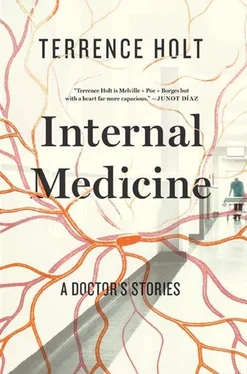I attempted a disarming smile. “I wanted to find out how you’re feeling.”
She sniffed again, then carefully extended her left arm in my direction, and rotated it slowly to bring the bandage at her wrist into view.
I looked, but did not move closer to inspect. “Does it hurt?”
She looked at it curiously. “No.” The arm hovered in the space between us, quivering slightly before — slowly — it withdrew.
When Carrie B was done with this languid demonstration of her capacity to hurt herself, there seemed little more to say. I recalled — with an effort — that it wasn’t her wrist I was worried about. I’d never entertained the possibility that her presentation had anything to do with the superficial lacerations on her wrist. Like any good stage magician, she had waved her hand in front of me knowing that it would distract me — knowing as well that it would hold my attention on her.
But tonight the show was plumbing some new depth of drama. What was going on in Carrie B that held her so uncomfortably on the edge of the examining table?
“Would you mind lying down?” I held up the bell of my stethoscope. “I’d like to listen to your heart.”
She made a face, a brief curl of her lips as if she had tasted something unpleasant, and then began to lower her upper body to the surface of the table.
It was an extraordinary performance. Her hands, which had been braced on either side of her, walked haltingly back toward the head of the table, while, inch by inch, she levered her body down. Her face took on a series of different expressions as she moved: eyes opening wide, as though astonished by something, then wincing, then widening again, her pupils very large in a way that suggested some huge autonomic discharge to which I was only a peripheral witness. She caught her breath repeatedly, in a series of gasps, each cut short. As she settled the last six inches I found my own breath catching in my throat.
As her back touched the table, the three of us — the nurse had been holding her breath too — let out a long sigh. I glanced over my shoulder at the nurse, who was looking back at me, her RN’s deadpan broken to the extent of an elevated eyebrow. Shaking my head, I leaned over Carrie B and placed my stethoscope on her chest.
A healthy young heart thudded under my hand. Air moved freely as she breathed. Her respirations were rapid and shallow, and her pulse was rapid as well. Moving down to her belly, I let my stethoscope lie there for half a minute, listening to the ordinary gurgling of an untroubled digestion. Then I started bearing down on the bell. This is an old trick: if you suspect someone is overreacting (as many do) to overt pressure, but fails to respond to the more subtle pressure from the stethoscope, you can be fairly certain that their reaction has more to do with mental processes than abdominal ones. But I hadn’t gotten more than an inch or two down before I heard a sudden sharp intake of breath, followed by a spasmodic clenching of the obliques.
I looked at the patient’s face: it was pinched, pale, except for two distinct red spots over her cheeks. Her eyes were closed, and her breathing fast and shallow. I listened again, and heard only the subterranean gurglings of an ordinary belly.
Tentatively, I placed a hand on the right upper quadrant, fingertips two inches below the margin of her ribs. “Take a deep breath,” I said, and prepared to dig in to find the edge of her liver. As she started to comply, her breath caught: her eyes flew open again with the same odd expression of surprise, and wild, dilated pupils. And something else: behind the surprise something kept close.
I lifted my hand from her belly.
“Does that hurt?”
The gaze she turned on me was theatrically blank.
“What?”
“When you take a deep breath. It seems to hurt you.”
“Oh. Yeah.” Pause. A tentative trial of deep breathing, staged carefully up to the point of pain. “It does. A little.” She smiled at me then, and there was nothing stagy about the smile, and there seemed nothing duplicitous about it, either: it was actually a very nice smile, winning, even, and I thought for a moment that Carrie B might under other circumstances have had a pleasant life. Instead of being not much short of terrifying. I looked back at her, trying to get her to come into focus: a small woman with finely chiseled features, pale blond hair with a slightly reddish cast to it, and it struck me that she was unusually well groomed. Her hair was clean, her skin clear, although I knew the color on her cheeks was more hectic than health. All of which was only a setting for the disturbing thing that glimmered in the depths.
“Do you think it’s anything serious?” she asked.
“What?” I said, a little abruptly. I muttered something noncommittal, as I always do, and started to scribble orders in the chart. There was a staginess in the question I found irritating. I hadn’t time for it. My pager was going off again, cutting like an alarm clock through the fog that had filled the room. The nurse picked up her clipboard in a gesture so matter-of-fact it seemed staged as well. Was everything staged? I wondered briefly, one of those odd thoughts that surface all the time but took on too much meaning in a place like this. “Frequent vitals,” I muttered, and left the two of them to manage as best they could. I finished up my orders — X-rays of the chest, expedited — and left the chart on the unit clerk’s desk.
THE PAGE THAT HAD broken the spell in the examining room had been the intern, who was waiting for me outside the second set of locked doors. He had a somewhat hectic expression himself, a shock of thick black hair standing straight up from above his forehead. As he read off from his clipboard summaries of the three cases he had already seen and the seven more that were waiting, he repeatedly brought his hand up to his forehead and drew it back across the top of his skull. He seemed to be trying to press it — the top of his skull, not the crest of hair — into place, but the only effect was to make the crest stand even higher. That, and the way his eyes kept opening very wide, made him look a little mad himself.
I couldn’t blame him; as he dutifully read off the minutiae marshaled on his list, I had the impression the nurses had been leading him on a merry chase around the building. Half of what he had been called about was, as usual, junk. In a medical hospital they wouldn’t have merited a note in the chart, much less a page to the on-call MD. But here the staff didn’t have the luxury of deciding what to ignore: they were required to call for anything out of the ordinary, and did. And the intern was required to see everything he was called about, no matter how unlikely. And now that I was done reviewing admissions, it was my job to supervise him as he made his rounds.
The intern — his name was Joe Bellagio — was one I had worked with several times before, and every time it had been like this: so busy we barely had time to talk about anything beyond the exigencies of the case at hand. I hardly knew him, beyond an impression of a tall, skinny fellow who usually seemed more rattled than he actually was, who took his responsibilities seriously, and generally knew what he was doing. He seemed sensible, thoughtful, and kind. All of which inclined me to like him.
He reached the end of his list of pending calls. “Who needs to be seen most?” I asked.
He studied the list again. “I think the guy in F-Max.”
“The chest pain?”
“Forty-eight, diabetes, smoker, eight out of ten for the last”—he checked his watch—“thirty minutes.” He checked his list. “And a prior MI.”
My own heart bounced slightly on a passing wave. “F-Max, huh?”
“Yeah.”
I sighed. “It’s chest pain.” And stopped. “Can’t they send him over?”
Читать дальше












